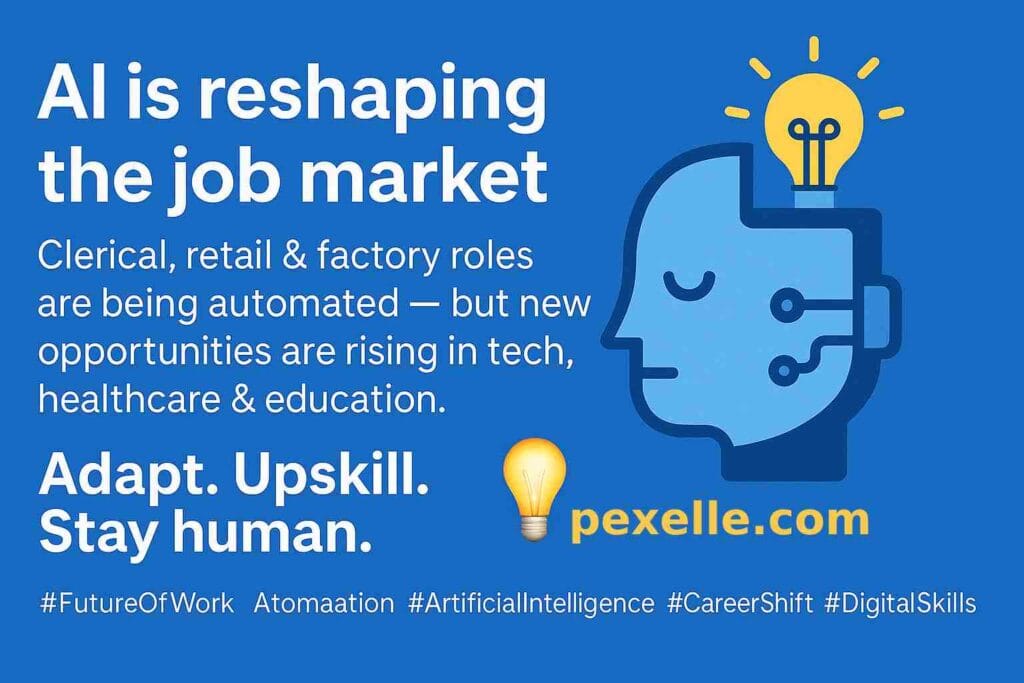Jobs Most Affected by Artificial Intelligence: Opportunities and Challenges

Artificial Intelligence (AI) is transforming the global workforce at an unprecedented pace. While some jobs are being automated or redefined, others are evolving with the support of AI tools, creating new opportunities and reshaping industries. In this article, we’ll explore the types of jobs most impacted by AI, the sectors undergoing major shifts, and what it means for workers and organizations in the coming decade.
🧠 Jobs Most Vulnerable to Automation by AI
- Administrative and Clerical Work
- Tasks like data entry, scheduling, bookkeeping, and document management can be efficiently handled by AI systems, reducing the need for traditional office roles.
- Tools like robotic process automation (RPA) and AI chatbots are replacing routine customer service and administrative support roles.
- Manufacturing and Warehouse Jobs
- Repetitive tasks on assembly lines are increasingly performed by robots and AI-guided machines.
- Autonomous warehouse robots (like those used by Amazon) reduce reliance on human labor for sorting and inventory management.
- Retail and Cashier Roles
- Self-checkout systems, smart shelves, and AI-driven inventory forecasting reduce the need for retail staff.
- E-commerce platforms use AI to personalize shopping experiences, decreasing reliance on in-store sales roles.
- Transportation and Delivery
- Autonomous vehicles and drones are beginning to disrupt driving, delivery, and logistics jobs.
- AI is also being used to optimize supply chains, reducing manual planning efforts.
🧠 Jobs Being Transformed by AI, Not Replaced
- Healthcare
- AI supports diagnosis, drug discovery, and personalized treatment plans, but human professionals (doctors, nurses, therapists) remain essential.
- AI assists, but doesn’t replace, critical decision-making and empathy-driven care.
- Education
- Intelligent tutoring systems and content recommendation engines personalize learning, but educators still guide, motivate, and mentor students.
- Teachers who adapt AI tools can increase efficiency and improve student engagement.
- Journalism and Content Creation
- AI tools can generate basic news summaries or social media posts, but original storytelling, investigative reporting, and creative direction require human input.
- Writers now use AI as a co-creator rather than a replacement.
- Software Development
- AI code assistants (e.g., GitHub Copilot) help speed up development, but complex systems design, architecture, and debugging remain deeply human tasks.
🌱 Jobs Created or Enhanced by AI
- AI and Machine Learning Specialists
- Demand is surging for data scientists, ML engineers, and AI researchers.
- These professionals design, train, and manage the very systems transforming industries.
- AI Ethics and Policy Experts
- As AI systems become more powerful, professionals who understand the ethical, legal, and societal implications are increasingly in demand.
- Prompt Engineers & AI Trainers
- A new breed of professionals who refine AI interactions and train large language models to behave in specific ways.
- Cybersecurity Analysts
- With more automation, the risk of cyber threats increases. AI-enhanced security tools need skilled analysts to interpret and respond to threats.
🔄 Preparing for the AI Future
- Reskilling and Upskilling will be critical. Workers in at-risk roles should consider gaining digital and analytical skills.
- Lifelong learning is no longer optional—AI-literate employees will thrive in a data-driven economy.
- Collaboration between human and AI systems will define success. Jobs won’t disappear overnight, but the nature of work will shift toward creativity, problem-solving, and emotional intelligence.
Conclusion
Artificial Intelligence is not just eliminating jobs—it’s transforming the very nature of work. While some roles are at risk of automation, many others are being enhanced or newly created. The key for workers and businesses alike is to embrace adaptability, invest in education, and focus on the uniquely human traits that machines cannot replicate.
Source : Medium.com




